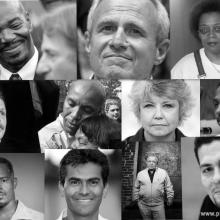wrongful convictions
October was Interfaith Month for Prop 34, a time set aside for leaders of faith traditions to address the question of California’s death penalty and advocate for its replacement. Hundreds of faith community’s have endorsed Proposition 34 because we believe the best way to do justice in California is to replace the death penalty with life in prison with no possibility of parole.
The will to see justice done is deep within the human spirit. We may not always agree on what “justice” looks like, but the belief in a just and fair society — and the desire to bring it about — are at the heart of how we live together and form a community. In religious traditions like Christianity, Islam, Judaism, and countless others, doing justice is a calling to enact God’s will.
The next question is, of course, what does that mean? Discerning justice can be even harder than doing justice.
SPOKANE, Wash. -- They stood in front of a shopping mall, shackled together, heads down, nameplates dangling around their necks, bearing the names of men and women who have died on America’s death row.
Cal Brown.
Teresa Lewis.
Cameron Todd Willingham.
Behind them, stood Victoria Ann Thorpe, dark makeup painted on her cheeks and a sign painted to look like blood stains waving above her head: “Their blood is on our hands.”
Somehow, despite Thorpe’s gory exterior, she’s approachable.
“Would you like information on the death penalty?” she asks shoppers as they exit the mall, unable to avert their eyes from the scene in front of them. She hands them a clipboard and one by one, they fill out postcards showing their support to abolish the death penalty in Washington. The cards will later be sent to state lawmakers. The group has also protested at Gonzaga University and so far has collected more than 200 signatures.
Thorpe, along with the Safe and Just Alternatives organization and The Inland Northwest Death Penalty Abolition Group, is seeking to pass a state law to replace the death penalty in Washington state with life without parole.
Nearly a quarter of a century after DNA testing was used to prove that a defendant had been falsely convicted of a crime, the American public has become familiar with the phenomenon and how the script plays out in our courtrooms.
The exonerated defendant stands before a judge and is informed that the conviction is vacated and the charges are dismissed. And then the former inmate —more than 100 have come from Death Row — is joined by family members and lawyers in a celebration on the courthouse steps.
Yes, it is a joyous occasion to step from behind prison bars after years — as many as 30 years in one case —of being locked up for a crime that was not committed.
But, as a report issued Monday by the National Registry of Exonerations makes clear, behind every one of these jubilant moments are tragedies, some of them of enormous proportion.
The report documents nearly 900 individual cases of exoneration. Combined, these (mostly) men and women served more than 10,000 years in prison for crimes they did not commit. In fact, in more than 100 cases, there was no crime at all — accidents were mischaracterized as murders and crimes were just concocted based on a web of lies and falsehoods.
It is Death Penalty Awareness Week, and supporters of human rights across the country have turned their attention to a uniquely complicated injustice -- the implementation of capital punishment in the United States.


